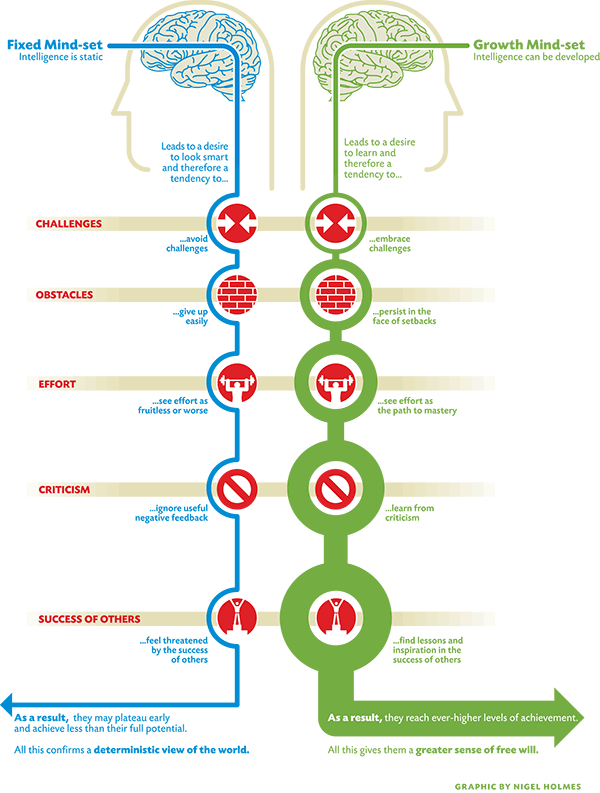The Single Most Important Trait for Success

This blog post is based on a speech I gave at Cave Springs ToastMasters Club in St. Charles, Missouri in March of 2014.
Have you ever wondered why some people are more successful than others? Have you asked yourself: what do world-class athletes, Nobel Prize Laureates and CEOs of fortune 500 companies have in common? What is it that they have that propelled them to the pinnacle in their respective field? Is there a significant predictor of success?
Well, what do you think it is? It is social intelligence? Good looks? Is it health? And what about IQ? Well, in fact, it’s none of those. Research has shown that it is grit.
Grit is passion and perseverance for long-term goals. Grit is having stamina, grit is sticking with your future, day in and day out, not for the week, not just for the month, but for years. It means working really hard to make your desired future a reality. Being gritty is treating life as a marathon, not a sprint.
Persisting in the face of setbacks
When I was a Games Maker at the London 2012 Olympic Games, randomly selected volunteers received tickets for the dress rehearsal in the Olympic Stadium a few days before the Opening Ceremony. I wasn’t one of them. I asked other volunteers all week if they had a spare ticket but nobody had good news. On the day of the show, I got up at 5 in the morning to be at the Olympic Park at 7 for my 9-hour shift. After my work my body was ready for a nap, but I was determined to stay and find a ticket. A fellow volunteer stayed with me, and so we walked around the Olympic Park for 3 or 4 hours and approached some 50 people, but had no success. She gave up soon, but I wanted to see the show so bad that I decided to stay.
Finally, with only one hour left, with my body rebelling and my stomach yearning for food, I knew I needed to alter my strategy. So I went into a first aid tent, asked for a piece of cardboard and wrote “I NEED TICKET” on it.
I stood in front of the Olympic Stadium for about an hour, enduring remarks and laughter (and soon: sore shoulders). I could have considered my day a series of setbacks and given up. But I didn’t. I kept telling myself: eventually, something had to give; eventually my efforts had to pay off.
And they did. Ten minutes before the show started, a man saw my sign and gave me his friend’s ticket who couldn’t make it. All the frustration and fatigue were gone in a second. I felt blissful, grateful and enthusiastic. Being in the stadium with 70,000 other volunteers and watching the spectacular show made the hours walking around not look so bad any more. A day that seemingly consisted of a succession of failures ended up being a grand success.
Growth Mindset vs. Fixed Mindset
While it is unclear exactly what instills grit in us, research has shown it is not talent.
What makes develop more resolve is a growth mindset, a concept developed by Carol Dweck, professor of psychology at Stanford.
A growth mindset is the notion that intelligence and the ability to learn is not fixed but can be developed through effort and deliberate practice. Our brains change and grow in response to challenges, so we are much more likely to persevere when we fail if we understand that failure is not a permanent condition. This view creates a love for learning and resilience that is essential for great accomplishment.
Growth mindset people more readily welcome challenges and are less afraid to fail. They embrace feedback and gain knowledge from it. They see effort as the path to mastery. And they find lessons and inspiration in the success of others.
In contrast, those with a fixed mindset believe that their basic qualities like their intelligence and talent are set in stone.
A fixed mindset gets in the way of success, because people that exhibit a fixed mindset gravitate to activities that confirm their abilities, whereas those with growth mindsets tend to seek activities that expand their abilities. Once the work becomes challenging, fixed mindset people stop enjoying school or their jobs. They can even feel threatened. That is the reason why rewarding effort is more beneficial than rewarding success or good grades.
Everybody can adopt a growth mindset
Everyone has elements of both mindsets, although you probably lean one way or the other. The good news is that you can train yourself to adopt a growth mindset.
I find that hugely inspiring and motivating. Having a growth mindset means that your true potential is unknown, so imagine how good you could be at something if you adopted a growth mindset and in turn became grittier. Remember: it is when we struggle that we learn and get smarter. Whatever challenge comes your way, think about it as an opportunity to get better. Take your best ideas, your strongest intuition and test them. Be willing to fail, to be wrong, to start over again with lessons learned.
I want to end with a challenge: next time the going gets tough and you’re thinking about quitting, tell yourself to be a little grittier about being grittier!
Tags
accomplishment, athlete, Benjamin Bathke, cardboard, Carol Dweck, cave springs, CEO, challenge, dress rehearsal, effort, enthusiasm, failure, fatigue, feedback, fixed mindset, fortune 500, frustration, Games Maker, grit, growth mindset, health, inspiration, intelligence, IQ, knowledge, learning, London 2012 Olympic Games, marathon, Nobel Prize, olympic park, Olympics, opening ceremony, perseverance, persistance, professor, psychology, resilience, resolve, rewarding effort, sign, social intelligence, sprint, Stanford, success, ToastMasters, volunteerRecent Posts
 Deutsche Welle – German bank blacklist of Yemeni nationals widensbenjamin - 02 May
Deutsche Welle – German bank blacklist of Yemeni nationals widensbenjamin - 02 May Deutsche Welle – The future of driving is (almost) herebenjamin - 02 May
Deutsche Welle – The future of driving is (almost) herebenjamin - 02 May A Reading Guide to the Accountability of Humanitarian Aidbenjamin - 02 December
A Reading Guide to the Accountability of Humanitarian Aidbenjamin - 02 December



